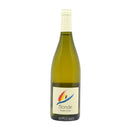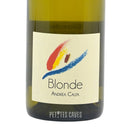Notre avis sur ce vin
Blonde 2023 - Domaine Andréa Calek
Un Viognier 100% qui fonctionne super bien et nous sommes heureux de retrouver cette cuvée (finalement assez rare) disponible. Un vin blanc pur, droit et coquin. N'hésitez pas, on peut facilement le déguster (boire) dès maintenant et toujours avec modération bien entendu.
Ce vin est droit, fin, élégant et aromatique. Vin net !
Allez "au près de ma blonde..."
Wine and cheese
| Wine and log | |
| Wine and chocolate | |
| Small point on the designation of origin: AOC and AOP | What is the difference between AOC (controlled) and PDO (protected) designations? |
| The PDO (Protected Designation of Origin) label is a European sign. It designates a product where all the stages of production are carried out according to a recognised know-how in the same geographical area. This gives the product its characteristics. It protects the name of the product throughout the European Union. The registered designation of origin (AOC) designates products that meet the PDO criteria. It protects the name on French territory. And is a step towards the PDO, now a European sign. It can also concern products not covered by European regulations (forest products for example). | The notion of terroir is the basis of the concept of Appellations of Origin: |
| A terroir is a particular geographical area. In it, a production draws its originality directly from the specificities of its area of production. The terroir is a delimited space in which a human community builds, over the course of its history, a collective production know-how. It is based on a system of interactions between a physical and biological environment and a set of human factors. This is where the originality and typicality of the product lies. | A little history on appellations: |
| The concept of Appellations of Origin was gradually built up at the beginning of the 20th century to combat fraud (law of 1905). A decree-law of 1935 relating to the defence of the wine market created the Appellation d'Origine Contrôlée. This is applicable to wines and brandies. Its scope was opened up to all agricultural and food products in 1990.Later, French policy to promote agricultural products inspired the development of European regulations. In 1992, the latter established the concept of PDO, the European equivalent of AOC, for products other than wines and eaux-de-vie. It was then extended to wines in 2009. Since then, the PDO covers all European wines and agri-food products whose production, processing and elaboration are carried out in a given geographical area, according to recognised know-how and specific specifications. In order to clarify the offer to the consumer, since 1 January 2012, once registered at the European level, the products concerned need only bear the PDO label. Only wines are authorised to bear the French Appellation d'Origine Contrôlée (AOC). | Discover our favorites: |










